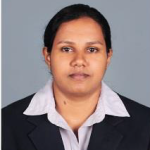[vc_row][vc_column][vc_row_inner][vc_column_inner width=”1/2″][vc_column_text]
The Institute of Archaeology and Heritage Studies intends to launch an online GIS course entitled ‘GIS for Archaeology’. Maps and Geographic Information Systems (GIS) serve a valuable role in Archaeological data management. Archaeology is a field that is closely linked to geographical phenomena, so a thorough knowledge of GIS technology is essential for anyone in the field. Therefore, we hope to offer this course to you, giving everyone who is interested in the field of archaeology, a very valuable opportunity.
The ‘GIS for Archaeology’ course provides a proper understanding of the basics of GIS and provides an opportunity to learn effective GIS data collection techniques. Mapping was given priority at the outset, but more analytical capabilities will be discussed in everyday applications. As resource persons for this series of online lectures, we have joined hands with two experts with years of experience in the use of GIS in the field of archaeology in Sri Lanka.
[/vc_column_text][vc_column_text]
Learning objectives
A student who completes this course will be able to:
- Understand the fundamentals of GIS
- Understand the types of spatial data
- Develop own skills of data collection and mapping
- Increase the quality of data management
- Understand data analysis workflows
- Understand data dissemination workflows
- Identify the new trends in GIS
[/vc_column_text][/vc_column_inner][vc_column_inner width=”1/2″][vc_single_image image=”516″ img_size=”full” alignment=”center”][vc_cta h2=”Register” txt_align=”center” add_button=”bottom” btn_title=”Register” btn_color=”warning” btn_size=”lg” btn_align=”center” css=”.vc_custom_1610294284070{margin-top: 0px !important;}”]
Registration is closed for the first batch.
[/vc_cta][porto_buttons btn_title=”Pay your course fee online” btn_link=”url:https%3A%2F%2Farchaeostore.archaeology.lk%2Fproduct%2Fgis-for-archaeology-archeological-data-management-mapping-and-analysis%2F” btn_align=”porto-btn-center” btn_size=”porto-btn-large” btn_title_color=”#ffffff” btn_bg_color=”#1e73be” btn_hover=”porto-btn-center-hz-bg” btn_bg_color_hover=”#3980bf” btn_border_style=”solid” btn_color_border=”#000000″ btn_color_border_hover=”#dd3333″ btn_border_size=”1″ btn_radius=”3″][/vc_column_inner][/vc_row_inner][/vc_column][/vc_row][vc_row][vc_column width=”1/2″][vc_column_text]
Course Module
Session 01
1. Fundamentals of GIS technology
1.1. Introduction to GIS and basic concepts
1.2. Vector and Raster data models
1.3. Vector data model (Point, Line, and Polygonal data)
1.4. Importance of GIS applications in Archaeology Session
Session 02
2. Working with spatial data in the archaeological domain
2.1. Data collection methods in GIS
2.2. Primary and secondary data sources
2.3. Understanding Coordinate Systems
2.4. Symbolizing data
2.5. Working with labels and annotations Session
Session 03
3. Raster data in archaeology and Georeferencing historical maps
3.1. Raster data model and data types
3.1.1. Historical hard copy maps
3.1.2. Arial photos
3.1.3. Satellite images
3.2. Georeferencing maps and satellite images
3.3. Challenges in Georeferencing historical maps
Session 04
4. Spatial data editing workflows
4.1. Digitizing data from a hard copy map
4.2. Updating digitized features using satellite Images
4.3. Preparation of an archaeological project: views, layers, and tables
Session 05
5. Making a Map Layout
5.1. Elements of a professional Map
5.2. Creating and Exporting Maps Session
Session 06
6. Geospatial Data Collection and Management Understanding GPS Technology
6.1. Introduction to GPS technology
6.2. Best Practices in field data collection
6.3. Methods of importing data from GPS Devices
6.4. Mobile-based locational data collection Session
Session 07
7. Working with different data types and data sources
7.1. Excel tables and mapping tabular data
7.2. Importing KML data
7.3. Data conversion tools and techniques
Session 08
8. Maintaining data quality
8.1. Geodatabases
8.2. Perform spatially and attribute validation Session
Session 09
9. Introduction to vector geoprocessing and data analysis
9.1. Working with Geoprocessing Tools
9.2. Generating Buffer Zones
9.3. The usage of Clip, Dissolve, Merge, Intersect, Union, Select etc.
9.4. Build geoprocessing models using Model Builder
9.5. Understanding and identifying the appropriate ways using tools Session
Session 10
10. Advanced Analysis
10.1. Advanced analysis
10.2. Raster analysis and digital terrain models (DTM)
10.3. Hydrological analysis to locate materials or archaeological sites Session
Session 11
11. New trends in GIS and modern applications
11.1. Online maps and data dissemination workflows
11.2. Story Maps for archaeological data representation
[/vc_column_text][/vc_column][vc_column width=”1/2″][vc_column_text]
Course Structure and information
Program Title : GIS for Archaeological Data Management, Mapping and Analysis
Mode: Virtual (Online)
Course start Date: 2021.01.11
Last date to register: 2021.01.05
Medium: Sinhala and English
Time Allocation: 11 Sessions (22 Hours)
Session duration: 02 hours for each session
: Lectures and practical work 01 hour and 40 minutes
: Discussion 20 minutes
Total course fee: Rs. 10,000
To register, please fill this form. We will send you more details on the course and payment.
* 50% discount for the undergraduates.
* Please note that the total course fee should be paid before 2021.01.10 and the fee will not be refunded to anyone who pays after that date.
* If a person who pays before the relevant date (2021.01.10) is unable to attend this course for any reason, the course fee will be refunded to him/her on a written request made on or before 2021.01.10. However, an administrative fee of Rs. 500/= will be deducted from the full amount.
* If for any reason he/she is not able to pay for the course in the first term after the relevant date (2021.01.10), he/she will be given the opportunity to join the course next time.
A certificate will be issued for those who will complete the course and 80% participation is also compulsory.
A trial version of the latest version of the ArcMap will be provided for the participants. With courtesy of GIS Solutions (Pvt) Ltd.
[/vc_column_text][vc_column_text]
Resource persons
Course Lecturers:
Mr.Supun Siriwardena
 Mr.Supun Siriwardena completed his B.A. Hons. (Geography Special) Degree with a Second Class Upper Division from the University of Colombo and M.Sc. in Geographic Information Systems (GIS) and Remote Sensing – PGIS from the University of Peradeniya.
Mr.Supun Siriwardena completed his B.A. Hons. (Geography Special) Degree with a Second Class Upper Division from the University of Colombo and M.Sc. in Geographic Information Systems (GIS) and Remote Sensing – PGIS from the University of Peradeniya.
He is currently a Senior Manager Technical and Presales at GIS Solutions (Pvt.) Ltd. He was also the Technical Product Manager/Specialist ArcGIS Platform and the Product Engineer for ArcGIS software, specialized in ArcGIS Online product at GIS Solutions (Pvt) Ltd. Plus he was the GeoSystems Analyst of the Just In Time IT Group.
Mr.Supun Siriwardena has been a visiting lecturer for the Transport Geography subject, of the B.Sc. in Marine Transportation Management and Logistics degree program at the Ocean University of Sri Lanka and a Visiting Lecturer for Master of Science in GIS and Remote Sensing degree program at the University of Sri Jayawardenepura. Mr. Supun Siriwardena also participated in the lectures on GIS as an Effective Decision Supporting Tool, an online training program for government IT professionals conducted by the Information and Communication Technology Agency. He has also been involved as a resource person and guest speaker for various other online lectures.
He was able to gain international experience, including the Esri User Conference in California, USA in 2016 and the Community Driven Development International Training programme at “Bala Vikasa”(Social Service Society) Warangal, Andhra Pradesh, India.
Ms. Darshani Samanmali
 Ms. Darshani Samanmali holds an M.Sc. in Geographical Information System and Remote Sensing from the University of Peradeniya and is currently pursuing her MPhil.
Ms. Darshani Samanmali holds an M.Sc. in Geographical Information System and Remote Sensing from the University of Peradeniya and is currently pursuing her MPhil.
She has been a visiting lecturer and a Research Assistant at the University of Colombo on Geographic Information Systems. Ms. Darshani Samanmali has also contributed to two books, Spatial Distribution of Air Pollution in the City of Colombo, Sri Lanka and GIS MANUAL – VOLUME I. She has authored numerous local and international research papers on geographic information systems.
Ms. Darshani Samanmali, who specializes in mapping related to geographic information systems, is also well versed in telecommunications and geolocation systems.
Guest Lecturers:
- Dr. Nuwan Abeywardena
Senior Lecturer, Department of Archaeology and Heritage Studies, Rajarata University of Sri Lanka - Resta Fernando
Scientific Officer, Postgraduate Institute of Archaeology - Chryshane Mendis
Independent Researcher
[/vc_column_text][vc_column_text css=”.vc_custom_1608960126590{margin-top: 20px !important;}”]
Course Coordinator

Sithani Jayatissa
Mobile: +94 712447624
Email Address: sithani@iahs.lk
[/vc_column_text][/vc_column][/vc_row][vc_row][vc_column][vc_separator css=”.vc_custom_1608961051894{margin-top: 30px !important;}”][vc_column_text css=”.vc_custom_1608961190904{margin-top: 30px !important;}”]
Schedule
| Module | Date |
| Inauguration | 11th January 2021 |
| Session 01 -Fundamentals of GIS technology | 14th January 2021 |
| Session 02 -Working with spatial data in archaeological domain | 18th January 2021 |
| Session 03 – Raster data in archaeology and Georeferencing historical maps | 21st January 2021 |
| Session 04 – Spatial data editing workflows | 25th January 2021 |
| Session 05 – Making a Map Layout | 28th January 2021 |
| Session 06 – Geospatial Data Collection and Management Understanding GPS Technology | 01st February 2021 |
| Session 07 – Working with different data types and data sources | 04th February 2021 |
| Session 08 – Maintaining data quality | 08th February 2021 |
| Session 09 – Introduction to vector geoprocessing and data analysis | 11th February 2021 |
| Session 10 – Advanced Analysis | 15th February 2021 |
| Session 11 – New trends in GIS and modern applications | 18th February 2021 |
[/vc_column_text][/vc_column][/vc_row]






